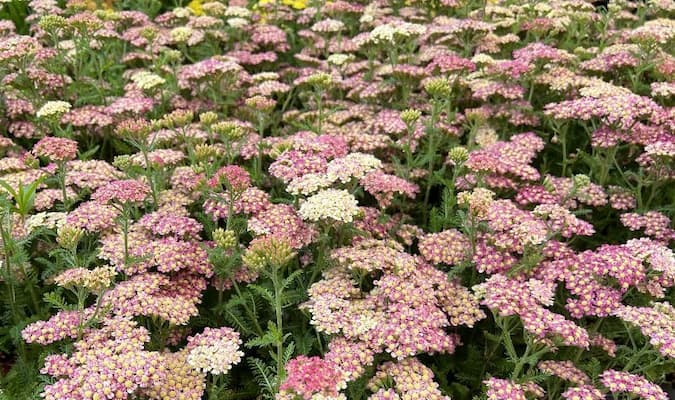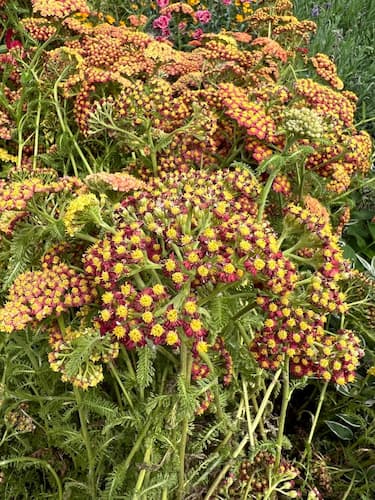How to Grow Achillea

About Growing Achilleas in Your Home Flower Garden
Growing Achillea plants is easy. Also called Yarrow, they are among the hardiest of perennials. Originating in Asia and Europe, perennial Achillea is a common wildflower, that has become very popular in home gardens. The small flowers are grown on strong stems, so they make fine cut flowers for vases and bouquets.
With a prominent bloom from summer to frost, they make a great addition to your home flowerbed. The tall plants look best at the back of the flower garden. You can also broadcast spread the seeds and plant them anywhere that wildflowers will grow. They generally compete successfully with weeds. The plant is slightly invasive and drought-tolerant.
Use caution with this plant as it is toxic to pets and farm animals. However, problems are uncommon as Achillea has bitter tannins that deter most animals from eating the plant.
Achillea Plant Specifics
Flowers Bloom: Summer to Fall
Flower Colors: The most common colors are bright, yellow flowers. Red and white blooms also exist, too.
Plant height: 2 to 3 feet tall.
Plant Width: 2 – 3 feet
Sunlight Needs: Full Sun
Plant Hardiness Zones: 3 – 9
Ideal Soil pH: 6.0 – 8.0.
Native To: Asia and Europe
Other Names: Yarrow, Bloodwart, Carpenter’s Weed, Common Yarrow, Devil’s Nettle, Nose Bleed, Steenchgrass
Perennial, Achillea Millefolium
Achillea Plant Propagation
Achillea is grown from seed. And, they sprout easily. Despite this fact, many homeowners buy plant starts at a garden store.
Sow seeds directly seeded into your flower garden or start indoors for transplanting later. For outdoor starts, plant Achillea seeds after the soil has begun to warm in the spring.
Sow seeds early in the season and cover lightly with soil.
Once your plants have been established, they can be propagated by separation of the root ball in the fall.
Note: For indoor starts, we recommend using a heated germination mat, to increase the speed of germination. And, it, results in a higher germination rate.
Final Plant Spacing: Space plants 1 to 2 feet apart.
Days to Germination: Seeds sprout in 14 – 28 days.

How to Grow Achillea Flower Plants
Growing Achillea flowers is easy. They prefer full sun and well-drained soil. They will do well in average soils and tolerate dry soil conditions. Water Achillea plants during dry periods, once or twice per week. Add a general-purpose fertilizer once or twice a season.
In rich soil, Achillea will grow tall, 1-3 feet, and may require staking.
Prune established plants as needed. Remove any dead, diseased, or unsightly leaves and stems. Deadhead spent blooms to promote continual, season long blooms.
Once your Achillea is established, they will grow well and bloom until frost. Being very hardy, they will likely survive the first light frosts before going dormant for the winter. They do not require mulching or protection in the winter.
Growing Yarrow in Containers and Flowerpots
Achillea plants can also be grown in flowerpots on your balcony, patio, or deck.
It grows tall, so make sure to grow them in a large container. As the plants grow tall, stake them, as needed.
Grow them as you would in a flower garden. However, they will need water a little more often. And, fertilize them once a month.
In cold regions of the country, you can overwinter them in the flowerpot inside a shed, garage, or greenhouse. Trim them back to a foot tall. Keep the soil barely moist. Add a little bit of water, only as needed. Bring them back outdoors after the weather begins to warm up in your community.
Insects and Plant Disease
Perennial Achillea is resistant to insects and disease. If insect or disease problems occur, treat early with organic or chemical insect repellents.
Achillea Plant Problems
Your perennial yarrow plants should grow well for many in the area where you select to grow them. There are few plant problems.
The plant can suffer heat damage when extended temperatures reach above 90 ° F.
Also, plant disease is uncommon. Treat the plants with a fungicide, only if needed.
Also, see: Plant Problems – Identify the causes and find the cures.
Related Articles
Also, people who read this article will like:
How to Grow Achillea – by Garden Hobbies
Please support our site. Shop for:
- rmmatthews100@hotmail.com
- 585-721-6528
- Rochester, NY
©1999-2024 GardenersNet.Com, All Rights Reserved

